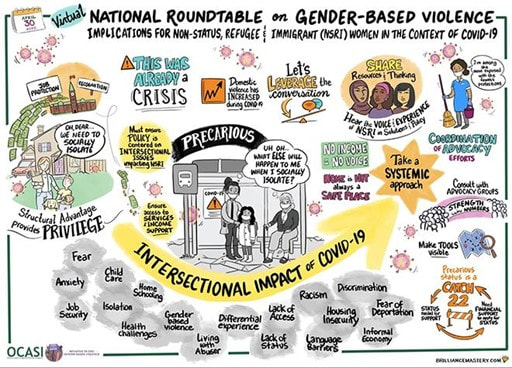|
By Professor Rupaleem Bhuyan and Margarita Pintín-Pérez On March 8, 2021, millions of people around the world will mark the 110th anniversary of International Women’s Day by organizing for gender equity and women’s rights including those who identify as lesbian, bisexual, trans, and/or queer. In the spirit of the IWD2021 campaign theme, #ChooseToChallenge, we highlight the call from migrant leaders to challenge systemic inequalities in our social, economic, and health care systems that are fueling the syndemics of COVID-19, gender-based violence (GBV) and systemic racism facing non-status, refugee and immigrant women. In their commentary published in BMJ Global Health, Stark et al (2020) argue that “the drivers and impacts of COVID-19 and GBV do not occur in isolation; rather, they present as a syndemic—each is made more destructive by the presence of the other.” Although risk of illness from COVID-19 does not increases the risk of GBV, our public health and economic response to the COVID-19 pandemic have only magnified long-standing inequalities for racialized migrant women leading to higher rates of COVID-19 infection, loss of life, and more severe cases of gender-based violence (Scotten, 2021, February 11). In Ontario, immigrants and refugees comprise about 25% of the total population but have accounted for 44% of all positive COVID-19 cases (ICES, 2020). Furthermore, the majority of front-line health workers and care workers are racialized migrant women from the Philippines, Jamaica and Nigeria, whose health and economic risks are magnified due to their precarious work and the lack of paid sick leave or unemployment insurance (RNWSN, 2020). Accompanying economic strain, social distancing measures, and fear that seeking help will lead to deportation or losing custody of one’s children further endanger migrant women, including refugee claimants, international students, temporary workers, and people without status, who are isolated with abusive partners, family members (Violence Against Women Learning Network, 2020), or employers. As Caregivers Action Center (2020) detail in their report “Behind Closed Doors,” many domestic care workers have lost their jobs or have faced increased abuse and exploitation during the pandemic. Early on in the COVID-19 Pandemic, grassroots leaders and service providers came together for a National Roundtable on Gender Based Violence to discuss how migrant women and people without status were already “in crisis” before the onset of the COVID-19 pandemic due to lack of access to vital health and social services, fear that contacting the police would lead to arrest, immigrant detention, or losing custody of one’s children, and their dependence on family members or their employers to maintain their legal status in Canada (see illustration of the roundtable discussion below). OCASI Initiative to End Gender-Based Violence (2020, April 30). Virtual National Roundtable: Gender-Based Violence against non-status, refugee and immigrant women in the context of COVID-19. Toronto, Ontario. https://ocasi.org/gender-based-violence
Towards challenging isolation and exclusion, roundtable participants emphasized the need to centre the lived experience of migrant women whose concerns have been too often overlooked in the public health and economic responses to COVID-19 and GBV. WORKING TOGETHER TO DISMANTLE STRUCTURAL INEQUALITIES Well before the COVID-19 pandemic, grassroots migrant leaders and advocates across Canada have been calling attention to structural violence produced through Canada’s immigration policies and systemic racism in Canada’s labour market. During this time of increased alertness, it is imperative that we listen to, learn from, and support migrant-led advocacy campaigns to address inequities in our economic, social welfare, and immigration systems to ensure basic human rights, but also to protect our individual and collective well-being. There is no more time for careless oversight. We must #ChooseToChallenge systemic inequalities that are fueling the syndemics of COVID-19, gender-based violence, and systemic racism. The way forward is clear and within reach, if we stand together. SUPPORT ECONOMIC & LABOUR CAMPAIGNS
ADVOCATE FOR FULL & PERMANENT IMMIGRATION STATUS NOW!
Rupaleem Bhuyan, PhD Associate Professor Factor-Inwentash Faculty of Social Work University of Toronto Margarita Pintin-Perez, PhD, MSW Senior Coordinator, Initiative to End Gender-Based Violence OCASI- Ontario Council of Agencies Service Immigrants
0 Comments
|
Global Migration & Health Initiative - Copyright © 2015-22


 RSS Feed
RSS Feed